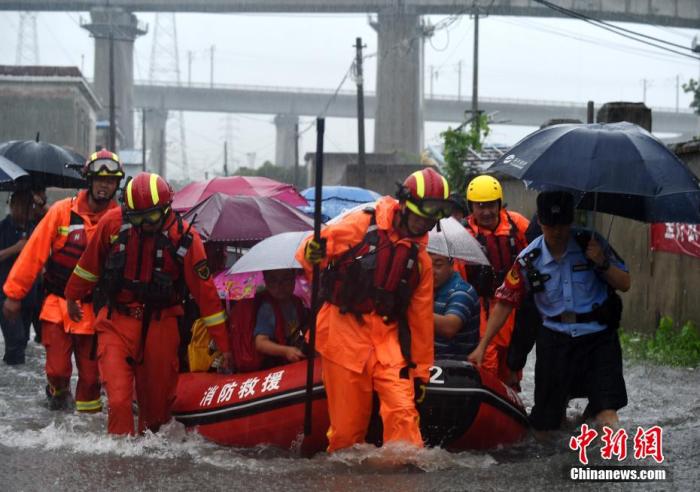China News Service, July 12th. According to the website of the Ministry of Emergency Management, the National Defense Office and the Ministry of Emergency Management will further discuss the deployment of heavy rainfall flood prevention and disaster relief work.
The meeting proposed to improve personnel evacuation plans, promptly shut down tourist attractions and construction sites, decisively transfer people in dangerous areas such as low-lying and prone to waterlogging, dilapidated houses, simple work sheds, mountains and watersides, and strengthen the safety management and control of transferred personnel, and take strict precautions. A secondary disaster occurred.
Data map: Rescuers transfer the trapped people.
Photo by Zhu Xiaomei
According to forecasts by the Meteorological Department, from the night of the 12th to the 15th, there will be heavy to heavy rains in northern North China, eastern Huanghuai, southern Northeast China, eastern Inner Mongolia and other places; from 14th to 16th, there will be heavy rains in the Sichuan Basin, southeastern Gansu, and southern Shaanxi. Severe to heavy rain, local heavy rain.
According to reports from the water resources department, there will be an obvious process of water increase in the Haihe and Luanhe Rivers.
According to the natural resources department's forecast, in the next 72 hours, the meteorological risk of local geological disasters in central and northern Hebei will be high.
Huang Ming, deputy commander-in-chief of the State Administration of Defense and Minister of the Emergency Management Department, emphasized that it is necessary to strengthen rolling consultations, research and judgment, and early warning and forecasting, and implement detailed flood prevention and flood rescue and disaster relief measures to ensure a safe flood season.
On July 12, Zhou Xuewen, Secretary-General of the State General Defense, Deputy Minister of Emergency Management and Deputy Minister of Water Resources, presided over a flood prevention special video conference and dispatch meeting, discussed and judged with China Meteorological Administration, Ministry of Water Resources, and Ministry of Natural Resources. The video link Hebei , Beijing, Liaoning, Shanxi, Sichuan, Shandong and other places, the fire and rescue corps and the forest fire brigade will further discuss the deployment of subsequent heavy rainfall flood prevention and disaster relief work.
Yu Yong, deputy secretary-general of the National Defense Administration and deputy director of the China Meteorological Administration, attended the meeting.
The meeting emphasized that local prevention and control agencies should strengthen their bottom line thinking, continue to maintain a high degree of vigilance, layer by layer the responsibilities of flood prevention and disaster relief centered on the system of chief executive responsibility, and focus on the implementation of "county leaders, towns, towns, villages, and village cadres." The basic-level guarantee responsibility of the “household households” will not relax and do a good job in flood prevention and disaster relief work.
It is necessary to closely monitor the development and changes of rain and water regimes, organize rolling meetings and judgments with departments such as meteorology, water conservancy, and natural resources, make good rain and water regime forecasts, and strengthen short-term warnings.
We must focus on the prevention of mountain torrents, geological disasters, floods in small and medium-sized rivers, and urban waterlogging, strengthen inspections and defenses of small reservoirs, sluices, dams, ponds and other water conservancy projects, and promptly deal with hidden risks when they are discovered.
It is necessary to improve personnel evacuation plans, promptly shut down tourist attractions and construction sites, decisively transfer people in dangerous areas such as low-lying and prone to waterlogging, dangerous houses and old houses, simple work sheds, mountains and watersides, strengthen the safety management and control of transferred personnel, and strictly prevent secondary disasters occur.
At the same time, strengthen the inspection and defense of super-police river sections and dangerous industrial sections to strictly prevent dangers and accidents caused by retreat.
In the process of preventing heavy rainfall in the previous period, the local government officials in accordance with the deployment of the President of the State, made every effort to do a good job in flood prevention, flood relief and disaster relief.
The Beijing Municipal Defense Agency made arrangements in advance to promptly start the yellow rainstorm warning response, strengthen forecast warnings and public reminders, complete the transfer of people in dangerous villages in mountainous areas, and bungalows in dangerous houses in urban areas, and temporarily suspend all outdoor sports, cultural and commercial activities; strengthen emergency response The deployment and pre-positioning of rescue forces, nearly 150,000 people are prepared for flood control inspections and emergency rescues, and all fire rescue forces are on duty; implement flood control measures at the grassroots level, strengthen the prevention of urban waterlogging, and provide traffic prompts and evacuation.
According to the development of the flood situation, the Sichuan Provincial Anti-fighting Commander quickly initiated the third-level flood prevention emergency response, gave full play to the functions of the prevention office at all levels, closely coordinated with the meteorological, water conservancy, natural resources and other departments to analyze and judge, and organized various departments at all levels to carry out a dragnet investigation. During the second heavy rainfall, 833,000 people in 34 counties in 8 cities (prefectures) were affected and suffered severe floods. Sichuan Province dispatched 55,600 rescuers of various types, relocated 173,000 people in an emergency, and strengthened the resettlement of displaced people and the prevention of secondary disasters. , To avoid casualties to the greatest extent.

